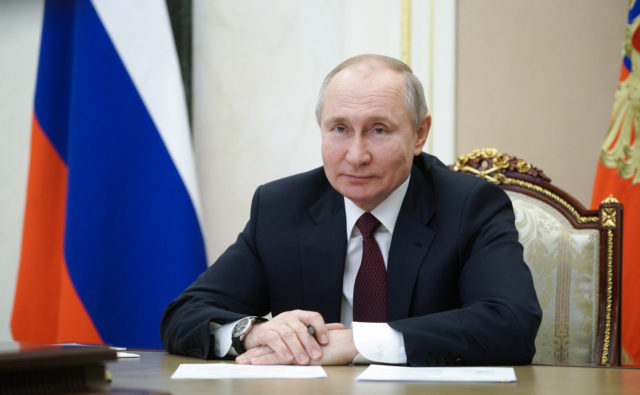
by Eric Rozenman
Pundits and foreign policy professionals say Vladimir Putin needs an “off-ramp” that permits him to save face while exiting Russia’s war against Ukraine. The Russian leader’s threats to use nuclear weapons, repeated recently after Western-backed Ukrainian troops took the offensive, bolster “off ramp” ruminations.
For a dictator like Putin, retreating from Ukraine war without something he can call victory means acknowledging weakness. Weak-looking dictators often lose power and sometimes—like Romania’s Nicolai Ceausescu and Libya’s Muammar Gaddafi—their lives, as the Russian president well knows.
Following his gun-point referendum in late September approving annexation of parts of eastern Ukraine, Putin called the U.S. atomic bomb attacks on Hiroshima and Nagasaki in World War II a “precedent.” Shortly before the staged voting he used to claim eastern Ukrainian land as Russian, he reiterated that “if the territorial integrity of our country is threatened, we will use all available means to protect Russia and our people—this is not a bluff.”
Yet for U.S. President Joe Biden and other Western leaders, staring at perhaps the most dangerous nuclear precipice since the 1962 Soviet American Cuban missile crisis, constructing a sufficiently attractive off-ramp for the Russian leader might undermine an equally important objective in a shaky world. That is the ability to deter other aggressive tyrants.
China’s Xi Jinping ordered summer maneuvers to showcase Beijing’s ability to strangle Taiwan without invading. North Korean strongman Kim Jong Un already has test fired a record 26 ballistic missiles, including over Japan, this year. Iran’s Supreme Leader Ayatollah Ali Khamenei’s thugs have killed more than 200 across the country to keep his theocratic-police state in power as it marches toward nuclear weapons.
So, how to off-ramp Putin without fracturing deterrence?
U.S. National Security Advisor Jake Sullivan said Washington privately warned Moscow of “catastrophic” consequences if it fires nuclear weapons. But Alexei Navalny, Putin’s highest profile political opponent—and therefore poisoning survivor and now prisoner in a maximum-security penal colony—says Russia’s boss and those around him do not view war as catastrophic. At least not until bogging down in Ukraine.
Rather, they saw it “as an amazing means of solving all problems,” confirmed by the Second Chechen War (1999-2009), the wars in Georgia (2008), Ukraine’s Donbas (beginning in 2014), Syria (beginning in 2015) and annexation of Crimea (2014). According to Navalny, Russia’s leaders learned that “war is not expensive, it solves all domestic political problems, it raises public approval sky-high, it does not particularly harm the economy, and—most importantly—winners face no accountability. Soon or later, one of the constantly changing Western leaders will come to us to negotiate.”
In other words, come to provide the Kremlin with road maps showing exits from invasions that leave them in at least partial possession of stolen lands, domestic status enhanced and, in exchange for what essentially amounts to a truce, undeterred from future aggression.
Things are different now with unexpectedly large losses, Moscow’s forces retreating in Ukraine and hundreds of thousands of Russians fleeing their leader’s conscription call-ups. How to leverage this opportunity without driving Putin, who has renewed conventional bombardment of Ukrainian cities, to push the nuclear button?
Analyst Walter Russell Mead writes that Putin’s September 30 speech showed him imagining himself as heading a global struggle against an arrogant Anglo-Saxon led West that amounts to an imperialistic neo-British Empire. It presented a resentful Putin who needs the conquest of Ukraine to strengthen Russia’s anti-Western destiny and frustrated that his possession of a massive nuclear arsenal hasn’t generated real international political power.
By providing Ukraine with tens of billions of dollars in military and economic aid and by imposing serious economic sanctions, Western countries, led by the United States, so far have contradicted the lessons Navalny says Putin and associates learned in the past two decades. In essence, the West provided Ukrainian President Volodomyr Zelensky and his nation an on-ramp to survival.
If Washington’s goal is to enhance the 77-year-old post-World War II system—part aspirational, part real—of sovereign states resolving disputes non-violently and to preserve that system’s U.S.-led alliances of deterrence, then Ukraine must emerge from this war victorious. That would mean not an off-ramp for Putin and his coterie but rather a send-off ramp.
In exchange for foregoing richly deserved war crimes trials, Washington, Kyiv and London could offer Putin and his coterie golden parachutes into a gilded cage. He and his consiglieres could take a fraction of their looted billions, their mistresses and their Mercedes-Benzes and live out their days in villas in the Chinese gambling resort of Macau. Under Ukrainian guard.
Fantasy? Yes, like the fantasy of a relatively stable, relatively peaceful world should Putin and his henchmen go unpunished.
First published in the Jewish Policy Center.







